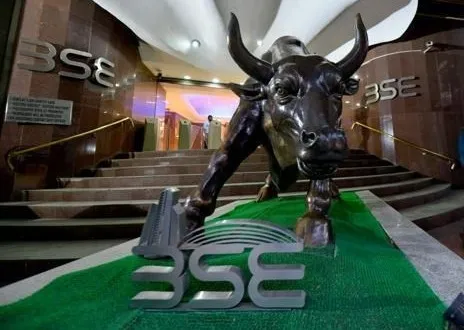Did the Indian Stock Market Open Higher with Sensex Surging 640 Points?

Synopsis
Key Takeaways
- Sensex increased by 640 points today.
- India ranks as the fourth largest economy globally.
- RBI's dividend payments may stabilize fiscal deficit.
- Geopolitical uncertainties are affecting market volatility.
- Institutional investors show mixed buying trends.
Mumbai, May 26 (NationPress) The domestic benchmark indices commenced the day on a positive note on Monday, buoyed by India's ascent to a new position in the world's largest economy rankings, enhancing investors' sentiment.
As of approximately 9:32 am, the Sensex was up by 640.3 points or 0.78 percent, reaching 82,361.46, while the Nifty increased by 187.39 points or 0.75 percent to 25,040.45.
The Nifty Bank index rose by 408.25 points or 0.74 percent, standing at 55,806.50. The Nifty Midcap 100 index traded at 57,114.35 after gaining 426.60 points or 0.75 percent. Meanwhile, the Nifty Smallcap 100 index reached 17,789.25, climbing 145.90 points or 0.83 percent.
Analysts suggest that the news of India becoming the fourth largest economy globally could provide a significant morale boost to the market.
The Reserve Bank of India's substantial dividend payment to the government, exceeding budget estimates, may help keep the fiscal deficit target for FY26 at 4.4 percent.
"This could help maintain a trend of low inflation and decreasing interest rates, which would continue to benefit the equity market. However, FII inflows have shown some volatility recently, indicating potential selling at elevated levels," stated VK Vijayakumar, Chief Investment Strategist at Geojit Investments Limited.
In the Sensex pack, notable gainers included M&M, PowerGrid, NTPC, Tata Motors, ICICI Bank, SBI, Tech Mahindra, L&T, Asian Paints, and Axis Bank, while Eternal was the sole loser.
Across Asian markets, Bangkok, Seoul, and Japan were in the green, while China, Hong Kong, and Jakarta were trading in the red.
In the previous trading session, the Dow Jones in the US closed at 41,603.07, down 256.02 points or 0.61 percent. The S&P 500 ended with a decline of 39.19 points or 0.67 percent, settling at 5,802.82, and the Nasdaq closed at 18,737.21, down 188.53 points or 1.00 percent.
On the institutional front, foreign institutional investors (FIIs) were net buyers, acquiring equities worth 1,794.59 crore on May 23, while domestic institutional investors (DIIs) purchased equities worth 299.78 crore.
Essential economic indicators such as India's GDP growth data, the minutes from the US Federal Reserve meeting, and US inflation figures are set to be released this week, which could significantly influence market sentiment, according to experts.
"Geopolitical uncertainties, the ongoing earnings season, institutional capital flows, and upcoming derivatives expiry dates are acting as key drivers of volatility in the Indian equity markets at this time," explained Devarsh Vakil, Head of Prime Research at HDFC Securities.









